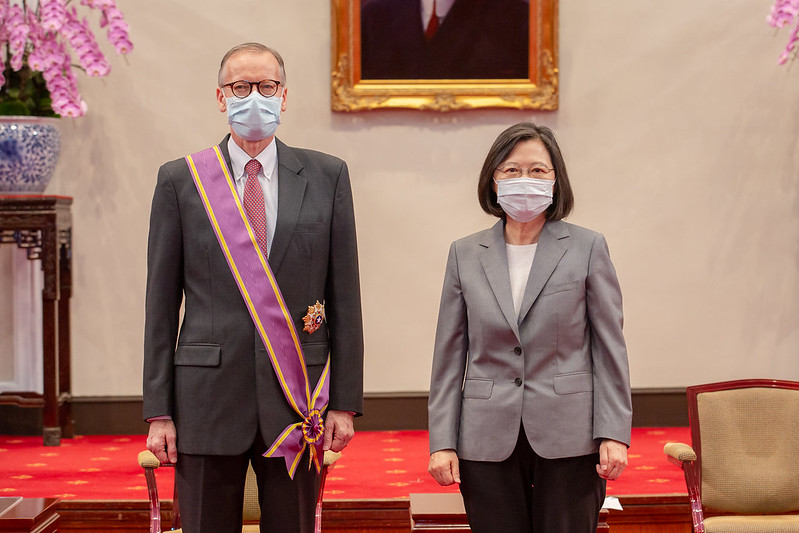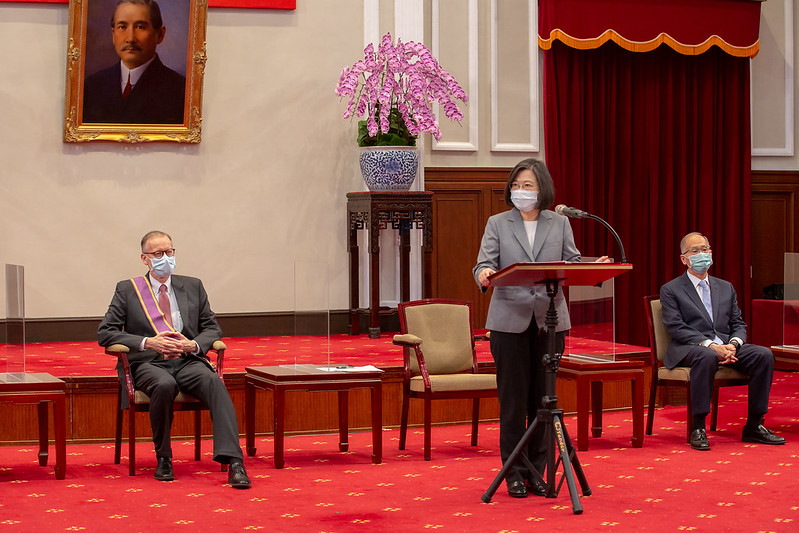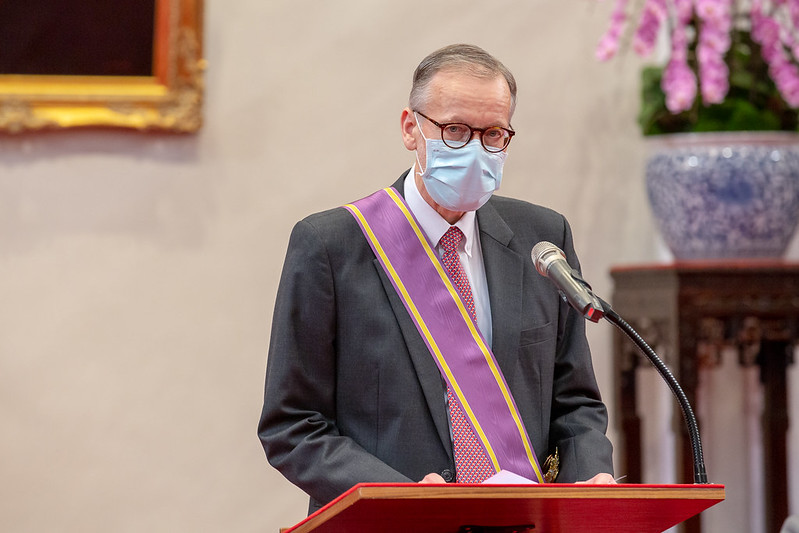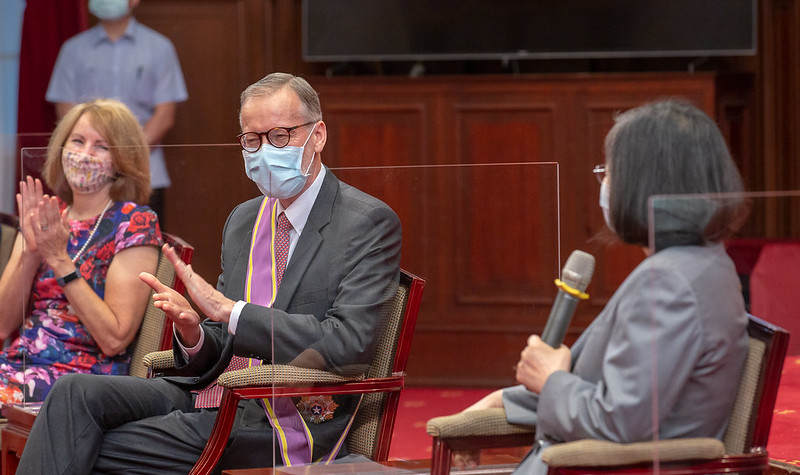News & activities
 News releases
News releases
On the morning of June 25, President Tsai Ing-wen conferred the Order of Brilliant Star with Grand Cordon upon William Brent Christensen, Director of the Taipei Office of the American Institute in Taiwan (AIT), in recognition of his remarkable contributions to enhancing Taiwan-US relations.
A translation of President Tsai's remarks follows:
Before we begin, on behalf of the people of Taiwan, I would like to convey my deepest condolences to all those affected by the tragic building collapse in Florida. This is truly heartbreaking news, and I hope that all search and rescue work goes ahead smoothly.
I am very glad to see Taiwan Semiconductor Manufacturing Company (TSMC) founder Morris Chang (張忠謀) here today, as well as all the attendees from American Chamber of Commerce in Taiwan and AIT. Your presence reminds me of all the hard work and progress achieved throughout Director Christensen's tenure.
Over the past years, we have all seen how active Director Christensen has been as a member of the diplomatic community. He has been everywhere in Taiwan. And together, we have attended numerous important events and received many important visitors from the United States. Just two weeks ago, we met with three visiting US Senators. They were here to announce the good news that the US would provide Taiwan with 750,000 vaccine doses. Thanks to the efforts of Director Christensen, as well as other diplomats and good friends from Taiwan and the US, the number of vaccine doses we received last week was more than triple the amount originally announced. I am sure you must have been very happy to have accomplished that mission, although at the time, the expression on your face was covered by sunglasses and a mask.
Director Christensen has a unique attachment to Taiwan. Prior to being posted here three times as a diplomat, he first visited Taiwan 40 years ago as a missionary. As an old friend of Taiwan, he fully understands the expectations and the importance that our society attaches to Taiwan-US relations.
When he assumed office as Director of the AIT Taipei Office, Mr. Christensen announced his intention to focus on promoting four priority areas: Taiwan-US security cooperation, economic and commercial relations, Taiwan's role in the global community, and people-to-people ties. I must say that during his tenure, Director Christensen has successfully promoted all four priority areas and has taken Taiwan-US relations to new heights.
During this period, the Coordination Council for North American Affairs was renamed the Taiwan Council for US Affairs. The US State Department relaxed its guidelines for interactions with Taiwan, US arms sales to Taiwan were normalized, and higher-ranking US officials can now visit Taiwan. Other examples include the recent provision of vaccine doses, the Trade and Investment Framework Agreement (TIFA) talks in the coming weeks, and the fact that the Global Cooperation and Training Framework (GCTF) continues to expand in scope and theme. These concrete achievements continue to deepen Taiwan-US relations and show that we are indeed real friends making real progress.
Apart from his diplomatic efforts, what makes Director Christensen such a popular figure in Taiwan is his sincerity and frankness. He has maintained the habit he had when he was a missionary of regularly getting on his bicycle to explore local communities in Taiwan. I have seen photographic evidence on AIT's Facebook page of Director Christensen riding his bike around town. I was most impressed to see one picture taken by a passerby of Mr. and Mrs. Christensen cycling in Tainan. I am sure that over the past two years, as you have become more famous, the chances of you being recognized and asked for an autograph have increased significantly.
During this time, Director Christensen's active profile on social media has also made the AIT Facebook page more interesting. As a result, people in Taiwan are more aware of AIT's achievements in boosting Taiwan-US relations. I know there was a photo with your economic section wearing their team vests. If they had all been giving a thumbs up, they would have been 100 percent Taiwanized.
Before you leave, I wanted to present you with the Order of Brilliant Star with Grand Cordon to thank you for your efforts and the contributions you have made to advancing Taiwan-US relations. I am sure I am speaking for everyone in Taiwan when I say how sad we are to see you leave. And of course, I would like to invite you to come back anytime to this beautiful and friendly country to see your old friends, and more importantly, to have a bowl of your favorite mango shaved ice. As you have said, Taiwan will never leave you, and we will continue to witness more advancements in Taiwan-US ties.
Director Christensen then delivered the following remarks:
Madam President, thank you for this magnificent award, your kind words and your friendship. Most of all, thank you for your courageous leadership in fostering closer US-Taiwan relations.
As I have said before, the US-Taiwan relationship is a rare and special one. Yet I have been personally – and pleasantly – surprised by the dramatic growth in our ties as we weathered the global pandemic over the past year and a half. The achievements we have reached together during that time are a true testament of the determination and creativity that we share in our efforts to advance the relationship. And the recent outbreak in Taiwan has brought the United States and Taiwan even closer.
The events of recent weeks will be among my most cherished memories during my tenure as AIT Director. The images of the C-17 Globemaster bringing Senators [Tammy] Duckworth, [Dan] Sullivan, and [Chris] Coons to announce the US donation of 750,000 doses of Moderna vaccine to Taiwan, and of the unloading of crates adorned with the American flag this past Sunday containing 2.5 million doses– more than three times the amount originally promised.
It has been gratifying to me that we were able to reciprocate the generous assistance that Taiwan provided to the United States early in the pandemic in the form of millions of face masks and other medical equipment. We have been very moved by the outpouring of gratitude from Taiwan society, the many personal notes and bouquets of flowers, and especially the heartwarming messages on the facades of the Grand Hotel and Taipei 101. The arrival of these donated vaccines during this difficult time in Taiwan has been described as timely rain (ji shi yu) but it points to the United States and Taiwan as real friends (zhen pengyou) who help each other in times of need.
As I assumed my position as AIT Director, I outlined four priorities – or four promotes (sige zengjin): Promote stronger US-Taiwan security cooperation; Promote stronger US-Taiwan economic and commercial cooperation, Promote Taiwan's role in the international community, and Promote stronger US-Taiwan people-to-people ties. I am pleased that we have made real progress (zhen jinzhan) in all of these areas. On security cooperation, the United States, in accordance with our commitment under the Taiwan Relations Act to support Taiwan's self-defense, has notified nearly $17 billion in arms sales to Taiwan. The United States has now officially made public the Six Assurances that reaffirm that commitment. And we have greatly expanded cooperation on dealing with non-traditional security challenges as well, such as humanitarian assistance and disaster relief and cybersecurity. Especially noteworthy in this regard, was the signing of a new US-Taiwan Coast Guard Memorandum of Understanding.
On economic and commercial cooperation, we have seen a significant expansion of trade and investment flows, the most noteworthy investment being TSMC's US$12 billion commitment to build a cutting-edge semiconductor plant in Arizona. This investment underscores the critical role that Taiwan plays in global high-tech supply chains, especially in semiconductors. In addition, we launched an important new dialogue, the Economic Prosperity Partnership Dialogue, and expanded efforts, as trusted partners, to build more secure and resilient supply chains. I am also pleased that the US-Taiwan Trade and Investment Framework Agreement talks will resume in the very near future.
On Taiwan's participation in the international community, Taiwan's impressive handling of the pandemic has given it new visibility and stature in the world. This was highlighted in the visit of Health and Human Services Secretary Alex Azar, the most senior US official to visit in over 40 years. Over the past year, we have seen a new willingness among likeminded partners to publicly express support for Taiwan to have a more active role in addressing global challenges. This was seen in the G7, the US-EU and US-Japan summits and other recent high-level meetings. This builds upon our own joint efforts to showcase Taiwan's experience and expertise under our flagship GCTF program. With Japan joining the program as a full partner and special funding from the US Congress, we anticipate the GCTF will continue to expand as a major multi-regional initiative. The US-Taiwan Democratic Governance Consultations in the Indo-Pacific Region that was established in 2019, also allows us to highlight our shared democratic values and promote Taiwan as a democratic model for the region and beyond.
Regarding people-to-people ties, we have seen remarkable progress across a broad range of cultural, scientific, environmental and education areas. For example, we recently signed a new Science and Technology Memorandum of Understanding. Our education ties are particularly strong. Generations of Taiwan's most prominent political, business and cultural leaders have studied in the United States, and we have worked hard to continue that tradition. Just last year we launched the US-Taiwan Education Initiative, which expands academic and teaching exchanges between the United States and Taiwan to advance two important goals: helping meet US demand for Mandarin language education and helping Taiwan reach its goal to be bilingual by 2030.
These dedicated, ongoing efforts to safeguard regional security, build our economies, expand Taiwan's international participation and deepen our people-to-people ties would not have been possible without the excellent, close cooperation we have at all levels here in Taiwan. Thank you again, Madam President, for your personal support and also that of your entire team, including Secretary General [David T.] Lee (李大維), Secretary General [Willington] Koo(顧立雄), and Foreign Minister [Joseph] Wu (吳釗燮).
I would also like to take this opportunity to thank my staff at AIT, some of whom are here today, for their contributions. And I want to thank my wife Brenda for her support, her sacrifices and her good humor. Being the AIT Director at this point in time has been a pleasure and a privilege. I believe this award signifies both the current robust strength of the US-Taiwan relationship and also the potential for it to continue to grow and develop. Even after my departure, I look forward to continuing to contribute to our joint efforts to further strengthen this vital relationship, but Taiwan will never leave me.
Among those in attendance at the ceremony were Mrs. Brenda Christensen, AIT Taipei Office Deputy Director Raymond Greene, American Chamber of Commerce in Taiwan Chairman C.W. Chin, TSMC founder Morris Chang, Secretary-General to the President David T. Lee, National Security Council Secretary-General Wellington Koo, and Foreign Minister Joseph Wu.












